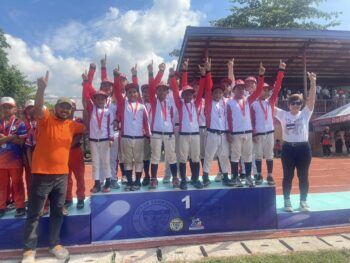LINGIG, Surigao del Sur (MindaNews / 14 July) — Classes resumed (on July 10) at Sitio Simowao (Diatagon, Lianga, Sds), for the students of ALCADEV (Alternative Learning Center for Agricultural and Livelihood Development).
However, unlike last week, they would be doing this in the makeshift classrooms, and some, under the trees. They would be sharing their ‘classrooms’ with other evacuees. That’s why class hours will be shortened to give time to the personal needs and food preparation of the other occupants. There will be no (demo) farm or garden to tend to as agriculture is half of the entire school program.
 The situation is totally different from last Monday’s (July 3). The students woke up early at 4 a.m., attended to some personal needs and by 5 a.m. were already at their respective farms until 7 a.m.
The situation is totally different from last Monday’s (July 3). The students woke up early at 4 a.m., attended to some personal needs and by 5 a.m. were already at their respective farms until 7 a.m.
I joined the group who harvested squash at the hilly part of the campus to help and practice my anthropological method of participant-observation. Although I helped a little only without my boots, the harvested squash totaled 368 kilos. We gathered all the other harvested vegetables and divided them according to the number of their dormitories.
After breakfast, students were in a hurry to catch the flag ceremony at 7:45 a.m. Then classes proceeded as usual just like in the public schools.
Students like to sing and teachers encourage them to express their thoughts and ideas in dramas. It was there, while visiting the faculty room, when I first heard the sad news relayed by some students. They secretly told their teacher that at the community, there were rumors that about 60 soldiers were seen by a farmer.
The teacher immediately downplayed the news so as not to attract panic. The news persisted in the afternoon but the teachers refused to vouch for it. Though we were all worried, we decided to proceed with the regular school activities. They went to visit their garden again and clean the surroundings. The night was calm as they settled to end the day.
The following day proceeded as usual. This time I joined the harvest of mongo beans. But the consistent news of sightings of military presence started to take effect on the parents who one by one would come to the school and get their child. They said the situation was the same before the massacre of their leaders last September 2015.
They were not afraid of the military but of their notorious militia, Magahat, in tow. I began to be afraid too. With Magahat, there is no way to negotiate with them.
Eventually, with the escalating tension, the teachers hosted an emergency meeting together with the parents. It was decided then that the school and community will stay together closely during the night. I was requested to go down and report the whole situation to the authorities. I was surprised to learn from the barangay chairman that the military had known the situation already as they had asked him about the matter in the previous days.
Back in the community, people remained nervous. Classes for TRIFFPS (Tribal Filipino Program of Surigao del Sur) and ALCADEV had been suspended already. The presence of barangay kagawad who accompanied us back calmed the people for a while. Except that by midnight, a drone or a chopper was heard around the surrounding communities, hovering for more than an hour. That jolted everyone. Hence, the exodus began.
In my ‘dialogue’ with Col.Amoma at the nearby military camp, he categorically pointed that there is martial law in order to ‘instill discipline among the people’.
He denied the midnight chopper or drone flight for a simple reason that in the 16-kilometer far Diatagon center, no such thing was heard. He was surprised why people were afraid of their presence in their community despite his knowledge of the traumatic event that befell this people two years ago. He said he felt pity on the plight of the displaced people but at the same time his soldiers refused food and medicine supply to them.
According to him, his main concern is the security of his troops as ‘soft targets’ of the NPA (New People’s Army). And I almost forgot that what we were talking about are the Lumads.
It’s been days now from that long journey by foot and 13 communities remain displaced. These people just returned to their respective communities last September 3, 2016 after a one-year evacuation. They left their farms ripe for harvest. Homes were still unfinished. Some seeds were about to be planted, waiting for the rainy season.
Last 2016 election, many of them voted for the present President with hope that he will champion their cause. Now, they have to contend with the reality. In my research, these people thrived already economically, culturally and even politically (they organized themselves well) even if they are left on their own. Just a matter of simple push or support to help them is needed to let them realize their dream of self-determination – recognition of their ancestral land.
Unfortunately, this is not happening right now. Not with martial law. How can they progress if every other year, they are forced to leave their homes and livelihood behind? As long as they are not recognized as people, with their own unique history and culture, they remain stuck in their sorry state. Insurgency will continue to be a problem to a government that does not know how to listen.
Violence will never be the way to progress and peace. Justice is. As if we never learn from the lessons of the past, martial law has never done any good despite the promised rhetoric. It crushed my heart to witness with my own eyes how mistakes are being repeated today.
Real order comes when we learn to leave the Lumads alone.
(Raymond Montero Ambray is an MA Anthropology student at the Ateneo de Davao University, working on his thesis on Lumad Social Movement. He is a Catholic priest assigned as assistant parish priest in Lingig, Surigao del Sur. Fr. Raymond posted this on his Facebook account on July 10. MindaNews was granted permission to publish this)






